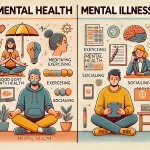Clinical Psychologist or Psychiatrist? Understanding the Difference in South Africa
When it comes to mental health care in South Africa, people often find themselves wondering whether they should see a clinical psychologist or a psychiatrist. Both professionals play vital roles in supporting mental health, but they differ in their training, approach, and the type of help they provide.
This post will explain the key differences between clinical psychologists and psychiatrists in South Africa to help you make an informed decision about the care you may need.
What Is a Clinical Psychologist?
A clinical psychologist is a mental health professional trained to understand and treat a wide range of emotional, psychological, and behavioral issues. Their approach focuses on talk therapy (psychotherapy) to help individuals work through challenges and achieve personal growth.
Training and Registration
- In South Africa, clinical psychologists are required to hold a minimum of a Master’s degree in Clinical Psychology. This rigorous qualification includes coursework, a research thesis, supervised practical training, a one-year internship, and a year of community service.
- They must also be registered with the Health Professions Council of South Africa (HPCSA).
What They Do
Clinical psychologists specialize in assessing, diagnosing, and treating mental health conditions using evidence-based therapeutic methods. They work with individuals, couples, families, and groups to address challenges such as:
- Anxiety and depression
- Trauma and PTSD
- Relationship difficulties
- Grief and loss
- Personality disorders
They may also conduct psychological assessments, such as cognitive testing, trauma assessments, and diagnostic evaluations.
What They Don’t Do
- Clinical psychologists cannot prescribe medication because they are not medical doctors.
What Is a Psychiatrist?
A psychiatrist is a medical doctor who specializes in diagnosing, treating, and managing mental illnesses from a biological and medical perspective. Their focus is often on treating conditions that may require medication as part of the management plan.
Training and Registration
- Psychiatrists in South Africa first complete a medical degree (MBChB) and then specialize in psychiatry through postgraduate training.
- They are also registered with the HPCSA.
What They Do
Psychiatrists assess mental health conditions, often looking at how biological factors (like brain chemistry) affect mood, behavior, and cognition. Their primary role is:
- Diagnosing and treating severe mental illnesses like schizophrenia, bipolar disorder, or severe depression.
- Prescribing and managing medication, such as antidepressants, mood stabilizers, or antipsychotics.
- Providing medical monitoring for patients on psychiatric medication.
What They Don’t Do
- While some psychiatrists offer psychotherapy, this is not their primary focus.
Clinical Psychologist vs. Psychiatrist: Key Differences in South Africa
| Aspect | Clinical Psychologist | Psychiatrist |
| Training | Master’s in Clinical Psychology | Medical degree + Psychiatry specialization |
| Approach | Psychotherapy and behavioral interventions | Medical and biological treatments |
| Focus | Emotional, psychological, and behavioral challenges | Severe mental illnesses requiring medication |
| Treatment Tools | Talk therapy, psychological assessments | Medication, medical monitoring |
| Registration | HPCSA (Psychology Board) | HPCSA (Medical Board) |
| Can Prescribe Medication? | No | Yes |
Who Should You See in South Africa?
Deciding between a clinical psychologist and a psychiatrist depends on your needs:
- If you’re struggling with emotional challenges, stress, trauma, or relationship issues, a clinical psychologist is often the best place to start.
- If your symptoms are severe, persistent, or you suspect you may need medication, a psychiatrist is the right choice.
- In many cases, clinical psychologists and psychiatrists work together. For example, a psychiatrist may prescribe medication for severe depression, while a clinical psychologist provides therapy to address underlying issues.
Working Together: A South African Example
In South Africa, it’s common for clinical psychologists and psychiatrists to collaborate. For instance:
- A patient diagnosed with bipolar disorder may see a psychiatrist to manage medication and a clinical psychologist to develop coping strategies and address emotional challenges.
- A person experiencing severe trauma-related anxiety might work with a clinical psychologist for therapy while consulting a psychiatrist for short-term medication to manage acute symptoms.
Why Understanding the Difference Matters
Knowing whether you need a clinical psychologist or a psychiatrist can help you access the right care sooner. If you’re unsure where to start, booking a consultation with a clinical psychologist can help determine your needs. They can assess your situation and refer you to a psychiatrist if necessary.
Final Thoughts
Both clinical psychologists and psychiatrists are essential in supporting mental health. While they approach care differently, their shared goal is to help you live a healthier, more fulfilling life.
If you’re ready to take the first step, contact us to schedule a consultation. Together, we’ll determine the best path forward for your mental health journey.




